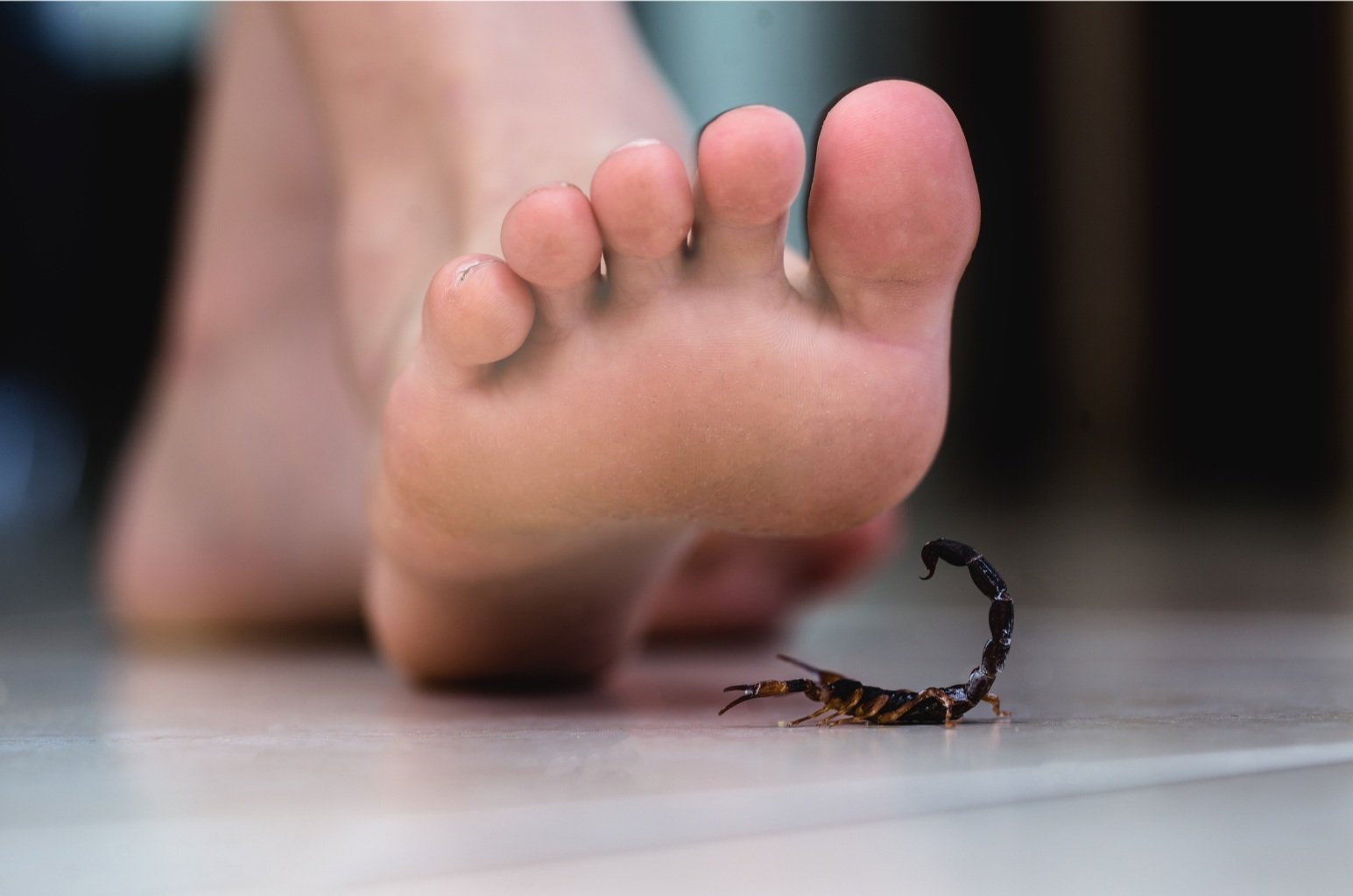Scorpion Invasion: Top Tips to Protect Your Home and Family from Scorpions
Not too long ago, I never thought I’d be the person giving advice on how to keep scorpions out of your home. In fact, I was just like most of you—trying to figure out why these creepy crawlers kept showing up in the middle of my living room. But after a few too many late-night encounters with these uninvited guests, I decided to make a career shift and start doing pest control. Now that I’m on the front lines of the scorpion battle, I’ve learned a lot about how to keep them out of our homes, and I’m here to share what I’ve picked up along the way.
Understanding Scorpions: The Unwelcome Guests
Common Scorpion Species in the Phoenix Metro Area
One of the first things I learned was just how many different types of scorpions we have in the Phoenix Metro Area, especially in places like Mesa, Gilbert, Chandler, Scottsdale, and Apache Junction. Here are the ones you’re most likely to run into:
Bark Scorpions: These are the bad boys of the scorpion world. They’re small, yellowish, and can pack a serious punch. Bark scorpions are the most venomous scorpions in North America, and they love to hide in dark, tight spaces. I’ll never forget my worst run-in with one. It was late at night, and I was deep asleep when I felt an excruciating sting on my chest. Before I could even process what had happened, another sharp sting followed. I jumped out of bed, heart racing, and threw back the covers, only to find a bark scorpion nestled between the sheets. That’s when I realized I had to get serious about understanding and dealing with these pests. It wasn’t just about keeping them out of my home—it was about protecting me and my family from these stealthy intruders.
Desert Hairy Scorpions: These are the big guys—literally. They’re the largest scorpions in North America. The good news? They’re not as dangerous as bark scorpions and tend to stay outside. Thankfully, they’re not as aggressive as they look.
Striped Tail Scorpions: These scorpions have distinct dark stripes on their tails and are pretty common around here. They’re medium-sized and can still give you a painful sting, but they’re not as toxic as the bark scorpions. They’re usually found hiding under debris or in woodpiles, so keeping your yard clean can help keep them away.
Yellow Ground Scorpions: These little guys are smaller and less venomous. They’re usually light brown or yellowish and prefer sandy soils. They’re mostly found in bathrooms and kitchens where it’s cooler and more humid, so keeping those areas dry and sealed up is key.
Why Scorpions Are Drawn to Suburban Homes
So why are these scorpions so interested in our homes? It turns out, they’re just looking for the basics—shelter, food, and water. As suburban areas like ours expand, we’re encroaching on their natural habitats, and our homes start looking like pretty good places to settle down. Cracks in the foundation, clutter in the yard, and even the cool air inside our homes can attract them. It’s almost like we’re rolling out the welcome mat without even realizing it.
The Dangers of Scorpion Infestations
Health Risks Posed by Scorpions
The scariest thing about scorpions is their sting. Most of the time, it’s just painful and annoying, but if you’ve ever been stung by a bark scorpion, you know it’s a whole different ball game. Their venom can cause serious symptoms like intense pain, numbness, and even difficulty breathing. I remember the first time I treated a home where a child had been stung. Thankfully, she was okay, but it was a stark reminder of how serious these pests can be.
The Emotional Impact of a Scorpion Infestation
There’s also the emotional side of dealing with scorpions. No one likes the idea of sharing their home with these creepy crawlers, and it can be really stressful—especially if you’ve got kids or pets. I’ve seen clients who were practically losing sleep over the thought of scorpions in their home. It’s not just about keeping them out; it’s about feeling safe and comfortable in your own space.
Proactive Prevention: How to Scorpion-Proof Your Home
Landscaping Tips to Deter Scorpions
One of the first things I tell people is to start with their yard. Scorpions love clutter, so keeping things tidy can make a big difference. Trim back bushes and trees that are close to your house—these can act like highways for scorpions. Also, make sure to remove any piles of wood, rocks, or debris where they might hide.
Home Maintenance Strategies
Your home itself can be a fortress against scorpions if you know what to do. Start by sealing up any cracks or gaps around windows, doors, and your foundation. You’d be amazed at how small of a space a scorpion can squeeze through. Weather stripping and door sweeps are a must—they’re inexpensive and can really help block entry points.
Since I started in pest control, I’ve made it a habit to check my own home regularly, especially after a storm or when the weather changes. A quick inspection every few months can catch any new gaps or cracks before scorpions find them.
Utilizing Scorpion Deterrents
There are a lot of products out there designed to keep scorpions away, and I’ve seen firsthand how effective they can be. Natural repellents like cedar oil or peppermint oil work well, but you have to reapply them regularly. I also recommend installing mesh screens over your vents and drains—this can be a game-changer for keeping scorpions out.
Sticky traps are another tool in the arsenal. Place them near potential entry points or in dark corners where scorpions might hide. While they won’t solve the problem entirely, they’re great for monitoring and catching any scorpions that slip through your defenses.
What to Do if You Encounter Scorpions
Safe Scorpion Removal Techniques
If you find a scorpion in your home, don’t panic. The best way to remove it is with a pair of long-handled tongs and a jar. Carefully grab the scorpion by its tail (but not too hard) and drop it into the jar, then release it outside—far from your home. If you’re not comfortable doing this, it’s okay to call in a professional.
Now, if you’re feeling particularly brave (or maybe just fed up), you can also smash the scorpion with a hard-soled shoe. Just be careful—scorpions can be quick, and you don’t want to risk getting stung. Before you go for the kill, make sure there aren’t any babies riding on the scorpion’s back. If there are, they can scatter and become a bigger problem.
Once you’ve dealt the final blow, don’t touch the scorpion directly, even after it’s dead. Instead, use a paper towel or some toilet paper to pick it up and make sure it’s really dead before disposing of it. You don’t want any surprises! After that, just toss it in the trash, and wash your hands thoroughly.
When to Call in the Professionals
Sometimes, no matter what you do, scorpions keep showing up. If you’re seeing them regularly or have found multiple in a short period, it’s time to bring in the pros. Professional pest control can identify and treat the problem more effectively than DIY methods.
Conclusion: The Importance of Ongoing Vigilance
Scorpions are persistent, but with the right strategies, you can keep them out of your home. Regular maintenance, a clean yard, and a few well-placed deterrents can go a long way in preventing an infestation. And if all else fails, don’t hesitate to call in the professionals—they’re equipped to handle even the toughest scorpion problems.
For me, it’s been a journey from dealing with scorpions as a homeowner to helping others protect their homes. I’ve learned that it’s all about being proactive and staying on top of the little things. By taking these steps, you can rest easy knowing your home is safe from scorpions, and you can get back to enjoying life in the beautiful Arizona desert without worrying about what’s lurking in the shadows.
If you’re dealing with a scorpion problem or want to prevent one before it starts, feel free to reach out. I’m here to help you keep your home safe and scorpion-free, just like I did for mine.





